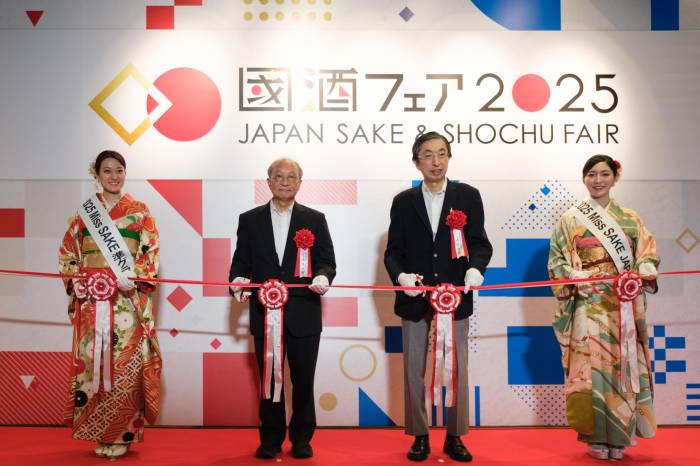Kokushu Fair in Osaka highlights global rise of Japanese sake, shochu, and awamori amid industry challenges
Record attendance and international interest reflect growing exports and innovation, but producers face raw material shortages and farming crisis
2025-06-24

The Kokushu Fair 2025 took place in Osaka on June 14 and 15, marking a significant moment for Japan’s traditional alcoholic beverages. Organized by the Japan Sake and Shochu Makers Association (JSS), the event brought together sake, honkaku shochu, awamori, and other drinks that are part of Japan’s heritage. The term “kokushu” refers to these beverages, which are made using koji mold and have been recognized as a UNESCO Intangible Cultural Heritage since 2024.
This year’s fair was notable because it combined two major events: the Sake Fair, which has run for 16 years, and the Honkaku Shochu & Awamori Fair, launched in 2022. The result was the largest gathering of its kind in the world. The event featured 1,149 types of sake from 339 breweries across 45 prefectures and 302 varieties of honkaku shochu and awamori from 65 companies in 12 prefectures. The fair coincided with the ongoing World Expo in Osaka, drawing attention from both local and international visitors.
The JSS sees the Kokushu Fair as a key opportunity for producers to connect directly with consumers. Attendees could taste a wide range of beverages and even purchase their favorites at some booths. The sake booths represented nearly every region of Japan, while the shochu and awamori booths were designed to resemble modern bars, highlighting their growing role in contemporary cocktail culture.
In recent years, sake exports have shown strong growth despite stagnation in the global alcohol market. In 2024, exports reached ¥43.5 billion, with shipments to a record 80 countries and regions—a 6% increase over the previous year. From January to April 2025, exports grew another 15% compared to the same period last year. Naotaka Miyasaka, chair of the JSS Overseas Sake Promotion Committee, credited this success partly to partnerships with international sommelier organizations. He emphasized that sommeliers play a crucial role in introducing sake to new audiences worldwide.
Miyasaka also pointed out that sake is becoming more diverse as young brewers experiment with different rice varieties, polishing techniques, and yeast strains. Some are using local rice or polishing less to bring out unique flavors, while others are pushing for greater delicacy by polishing more. This innovation is making sake more appealing to a broader audience.
Honkaku shochu and awamori are also evolving. Traditionally consumed in southern Japan where rice is harder to grow, these spirits are now gaining popularity in bars both in Japan and abroad. At this year’s fair, bartenders showcased cocktails made with shochu and awamori, including past winners from cocktail competitions. Kohsuke Kami, chair of the JSS Shochu Promotion Subcommittee, explained that shochu can be made from ingredients like sweet potatoes, barley, rice, or buckwheat. Different koji strains and aging methods create a wide range of flavors that are attracting interest from international bartenders.
Despite these positive trends, both industries face serious challenges with raw materials. The price of table rice has nearly doubled since 2024 due to supply-demand imbalances. Sake rice is more difficult and costly to grow than table rice but is now less profitable for farmers because table rice prices have surpassed those of sake rice. Many farmers are switching crops or leaving the business altogether as the average age of rice farmers rises to around 69 years old with few successors.
Miyasaka called on the government to take emergency action to stabilize prices and support long-term supply chains. He warned that without profitable farming conditions that attract new generations, both rice cultivation and sake production could collapse.
The shochu industry faces its own threat from motogusare-byo, a root rot disease affecting sweet potatoes used in imo shochu production. First reported in 2018, it has spread quickly across Japan and forced some producers to cut back on output.
Both industries depend on close cooperation between farmers who grow the ingredients and breweries that produce the beverages. The JSS believes that increasing demand—especially among consumers who appreciate high-quality products—is essential not only for business but also for supporting farmers.
The Kokushu Fair provided a unique platform for people to experience Japanese national drinks firsthand and learn about their history and production methods. By promoting these beverages at home and abroad, organizers hope to secure their future while supporting those who make them possible.
Founded in 2007, Vinetur® is a registered trademark of VGSC S.L. with a long history in the wine industry.
VGSC, S.L. with VAT number B70255591 is a spanish company legally registered in the Commercial Register of the city of Santiago de Compostela, with registration number: Bulletin 181, Reference 356049 in Volume 13, Page 107, Section 6, Sheet 45028, Entry 2.
Email: [email protected]
Headquarters and offices located in Vilagarcia de Arousa, Spain.